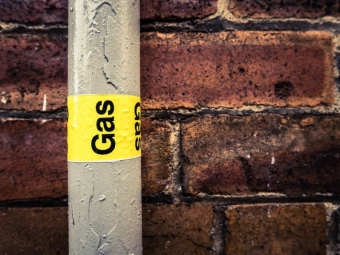If you smell gas in your home, this likely means there is a natural gas leak. There is no missing that distinctive “rotten egg” smell (known as Mercaptan). The foul odor is there quite intentionally because gas has no smell otherwise. Gas under pressure can also make a hissing noise, another way you can detect a leak.
Natural gas is widely used throughout Canada, providing cooking and heating for millions of homeowners. Gas leaks are quite serious and how you respond the danger can make a real difference. Here are the steps to follow if you ever smell gas.
Turn Off the Gas
Make your way to the meter and turn the gas off. In most cases, you turn the control valve in a clockwise direction until it will no longer turn. There should also be instructions on how to turn the valve off clearly indicated in documentation or on the meter. Consult these before proceeding.
If you have a gas oven, make sure it is turned off. Do you also have an emergency control valve? If so, you must also switch it off.
Let in Fresh Air
Open all of your windows and doors to ensure the gas exits the structure and fresh air enters.
Extinguish Flames and Avoid Electricity Use
If you have a fire going in your fireplace, or even a lit candle, be aware that these can lead to explosions. Put them out immediately. If you need to see in darkness, use a flashlight. Do not strike a match.
Do not operate any electrical devices. These can emit a spark, which can also result in an explosion. Even a cellphone can act as an igniter.
Exit the Building and Call 911
Once you switch off the gas, leave the building. Use your cellphone or a neighbor’s landline to call 911 and report what has happened as soon as you are clear. The authorities will then dispatch someone to check the problem and order the necessary repairs. They will also check to make sure everything is operating correctly and there are no further leaks.
Seek Medical Attention
If you feel ill from your exposure to the gas, seek medical attention to make sure you are alright.
Outdoor Gas Leaks
In addition to indoor leaks, you may run across pipes leaking outdoors (e.g. digging operations that have distributed or otherwise damaged pipes). As soon as you detect a leak, vacate the area, head upwind, and call 911. If you have machinery running, do not turn it off in case a spark occurs that ignites the gas.
Do not attempt to extinguish any fires that are the result of a gas leak. Leave the area and call 911. Firefighters have the training to handle these sorts of fires.
Prepare a Safety Plan
It is helpful to have a safety plan in place, especially if you have young children in the home. Decide on the fastest and safest way for everyone to exit the house in the event of a natural gas leak. Make sure everyone knows this route and help them remember by practicing.






